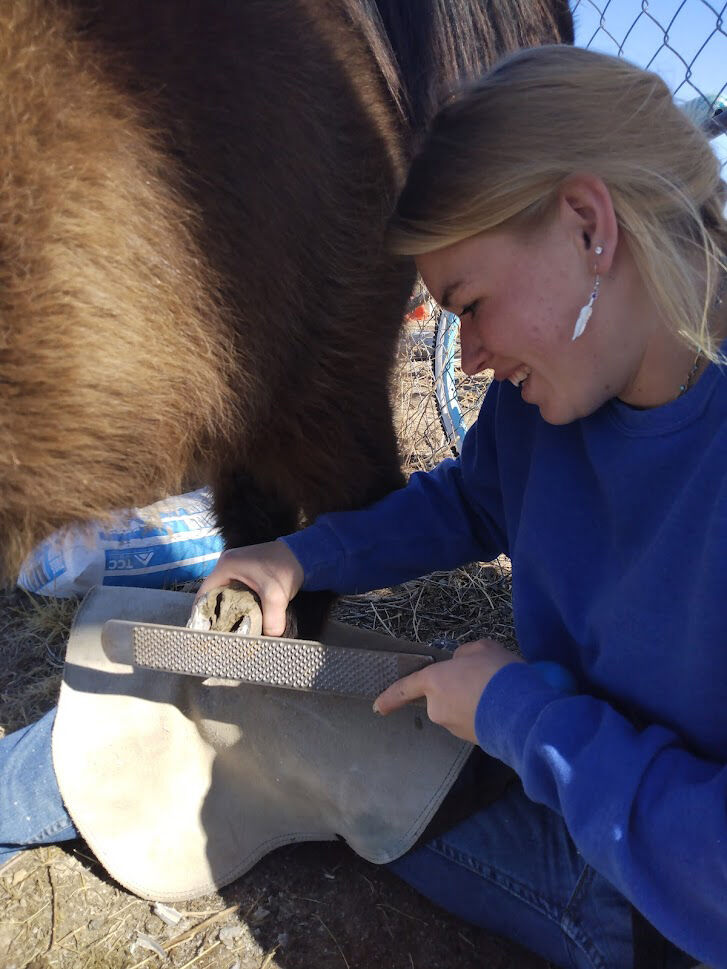In an age and economic climate when young people are questioning whether the approved paths toward a satisfying, productive and remunerative life work any longer, Elle Adams has a solid future in front of her.
The 18-year-old, who has not yet graduated from high school, already has her own business as a farrier. Sugar Farms Farrier Services LLC performs hoof care while shoeing horses in and around Elle’s hometown of Avondale, Colorado, which sits in the southern half of the state, just east of Pueblo, “in the flatlands,” Adams says.
Elle (pronounced “Ellie”) grew up on a farm with four siblings, a mother who showed horses and participated in rodeos, and a father who gave her a strong work ethic. From an early age, Elle was the most “horsey” of her siblings. She has trained and saddle-broken horses for kids to ride, as well as for carts.
Not that Elle’s interests are limited to horses. “I’ve milked goats since I was 6,” she said. She has participated in 4-H programs and helped neighbors farrow pigs. She recently traveled to Amarillo, Texas, to show goats.
Apart from her family, Elle credits two family friends with encouraging her interest in horses and horseshoes. “I’ve had some really good people in my life,” including family friends Anna Cesar and John Wright, both of whom she calls “jacks of all trades” when it comes to farm and ranch chores. “My mom knew Anne from way back, and we’ve gotten closer. They are both like my bonus grandparents.”
At age 16, Elle spent a summer earning her certification as a farrier when she passed a course taught by the Equine Lameness Prevention Organization, Inc., a nonprofit dedicated to certifying hoof care providers and providing the latest scientific information on hoof care. She received help from a couple of scholarships. “It was a small class of five people. I was the youngest one and the only female; the others were all older men,” she said.
The certification equips Elle to provide hoof care for any ungulate, not just horses. She has already provided hoof care services to mules and one wild ass adopted by a team from the Bureau of Land Management. “That one took a little longer to settle down and keep still,” Elle acknowledges.
Her tools include rasps, nippers, a hook knife and a small forge, anvil and hammer for shaping and softening horseshoes. Elle has forged her own shoes, which she acknowledges is “a workout.” Working with horseshoes requires upper-body strength. Although she usually buys horseshoes ready made, they still require heating and softening to custom fit a horse’s foot. The horses appreciate it, she said, and many remember her visits and welcome her back.
Elle already has a client base of about 36 people, whom she serves in the evenings and on weekends. She is looking forward to expanding her customer base when she graduates from high school and can drive longer distances. An average trimming and shoeing can take about 15 minutes for all four feet, and a full shoeing can take about an hour.
Her clients are all farmers or ranchers themselves, and some of them perform some of their own hoof care. But more of them are turning to outside providers.
It’s one of those niche jobs that few know about who aren’t involved with it, but that enjoy high demand and good income potential. Specialized farrier publications report that there are about 25,000 registered farriers in the United States—not enough to meet demand. Those who work with racing, show and pleasure horses can easily make six figures a year. Farrier services are rarely advertised because qualified farriers are in high demand by the horse-owning public. Elle get her clients by word of mouth. “I really enjoy the farrier thing,” she said.
A couple of Elle’s clients have young kids who pay close attention to her as she works. At 18, Elle may already be inspiring the next generation of hoof care specialists.
David Murray can be reached at [email protected].




